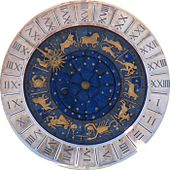Preṣya yoga
| Astrology |
|---|
 |
| Background |
| Traditions |
| Branches |
| Astrological signs |
| Symbols |
Preṣya yoga(Sanskrit:प्रेष्य योग) is aplanetary combinationin Hindu astrology. A person born withpreshya yogais poor, unhappy and uneducated. He hears harsh words from others and works in slavery throughout his life.[1]
The term comes from the Sanskrit wordpreṣyawhich means "servant."[2]
Vedic usage
[edit]InAitareya Brahmana,the termpreṣyaoccurs in the sense of a menial servant, Śudra or a slave employed for being sent on an errand. InPalitexts ofBuddhists,preṣyais referred to in its prakritic forms –pessaorpesiya- meaning a messenger or a servant in general. However, in early literature there is hardly any elucidation regarding the nature of job, their person, or mode of dressing etc., that is available.[3]Bharuchi (600-650 A.D.) in his commentary onManustates thatpreṣyawere a servile class different from the four types of slaves.[4]
Bhattoji Dikshita states (Siddhahta Haumadi Ch.XIV.621):
- प्रेष्यब्रुवोर्हविषो देवतसंप्रदाने
that "the object of the verbpreṣyaandbruhi(imperative singular ofDivadiverb, meaning send or utter) denoting sacrifial food, takes the sixth case-affix, when making offerings to deity is meant or when the deity is the recipient "(Shatapatha BrahmanaI.5.3.8).[5]Valmikistates (RamayanaSundar Kanda 39.39):
- अहं तावदिह प्राप्तः किं पुनस्ते महाबल |
- नहि प्रकृष्टाः प्रेष्यन्ते प्र्ष्यन्ते हीतरे जनाः ||
that honourable people are never asked to work aspreṣyas.
Usage in Hindu astrology
[edit]Mahadeva tells us that a) if the lord of the 10th house is weak and associated withpapagrahas('dire malefics') or b) ifMercurycombining with eitherJupiterorVenusis in atrika-bhava(the 6th,8th or 12th from thelagna) or c) if the 10th house receives the aspects of manypapagrahas,or d) if the lord of the 10th house is relegated to an evilbhava,then the person is inept and inefficient. He also states that if the 12th house from thelagnais heavily afflicted bypapagrahasthe person will suffer loss of wealth repeatedly, and that in case thelagnaor the 2nd house or the 11th house and their respective lords are afflicted while placed in cruelshashtiamsasin evilbhavasthen one suffers want of wealth throughout life and contracts debts.[6]Theseyogasindicate penury but are notpreṣya yogas.
In Chapter VI of hisJataka Parijata,Vaidyanatha Dikshitaprovides the followingpreṣya yogasleading to servitude:-
- 1) If theSunis in the 10th house from thelagna,theMoonoccupies the 7th, Mars the 3rd and Jupiter is in the 2nd house, one serves others at night-time.
- 2) If a fixed sign (ScorpioorAquarius) rises in thelagna,Jupiter owns the 2nd house and occupies the 8th, Venus is in the 9th and the Moon in the 7th, then one serves others.
- 3) If the night-time birth is in a moveable sign and the lord of thelagnais inRiksha-sandhiandpapagrahasoccupy thekendras,one serves others.
- 4) If the day-time birth is in a fixed sign andSaturn,the Moon, Jupiter and Venus are inrasi-sandhior if a person is born duringKrishna-pakshanight-time, Venus is in thelagna,the Moon even if inUttama-vargasis not in akendraand Jupiter inAiravatanshis inrasi-sandhi,one serves others.
- 5) IfMars,Jupiter and the Sun situated in the 3rd, 4th and the 10thbhavasinbhava-sandhiorrasi-sandhi,the Moon though in a benefic sign is in an evilnavamsaand Jupiter combines with the lord of thelagna,one serves others
- 6) If Jupiter is in atrika-bhavainCapricornsign and the Moon occupies the 4th house, one serves others.
He states:
- पापात्मा कलहप्रियः कथिन्वाग् भुदेवतादूषको विद्याभाग्यविहीन दुष्टरसिको मात्सर्यकोपान्वितः |
- मिथ्यावादविनोदवञ्चनरतः शिश्नोदरे तत्परः कारुण्यास्थिरमाननभङ्गिचतुरो योगे परप्रेष्यके ||
- "The person born withpreṣya yogawill be evil-minded, quarrelsome, harsh in speech, disrespectful, unfortunate, a favourite of evil persons, envious, evil-tempered, liar, deceiver, selfish, fraudulent and frequently insulted by others. "[7]
Significance
[edit]Vaidyanatha Dikshita explains that there areyogasthat indicate cancellation ofRaja Yogas,there are theReka Yogaswhich areDaridra Yogaswhen a person though wealthy leads a slovenly life, and there are thepreṣya yogaswhose presence makes one lead a lowly life throughout one's life-time as a menial or a slave (Jataka ParijataVI.1).[8]The presence of theseashubha yogasalong with other evilyogasproduce very bad results; if occurring withPaisacha Yogaserious mental illness or derangement is bound to result.[9]
References
[edit]- ^Narayan Dutt Shrimali (June 2012).Practical Palmistry.S. Publishers. p. 272.ISBN9789381384350.
- ^Theodor Benfey (1998).A Sanskrit-English Dictionary.Asian Educational Services. p. 619.ISBN9788120603707.
- ^S.P.Tiwari (1987).Royal Attendants in Ancient Indian Literature, Epigraphy and Art.Agam Kala Prakashan. pp. 91, 92.
- ^Dimensions in Indian History.Anamika Pub. 2005. p. 59.ISBN9788179750933.
- ^The Siddhanta Haumadi of Bhattoji Dikshita.Motilal Banarsidass. p. 370.
- ^Mahadeva.Jataka Tattva (With translation and commentary by Dr. Suresh Chandra Misra).Ranjan Publications. p. iii. Archived fromthe originalon 2014-08-08.Retrieved2014-08-03.
- ^Vaidyanatha (2008).Jatakaparijata (With translation and commentary by Gopesh Kumar Ojha).Motilal Banarsidass. pp. 373–376.ISBN9788120822641.
- ^Vaidyanatha (2008).Jatakaparijata (With translation and commentary by Gopesh Kumar Ojha).Motilal Banarsidass. p. 343.ISBN9788120822641.
- ^Gayatri Devi Vasudev (2008).The Art of Prediction in Astrology.Motilal Banarsidass. p. 39.ISBN9788120832299.
